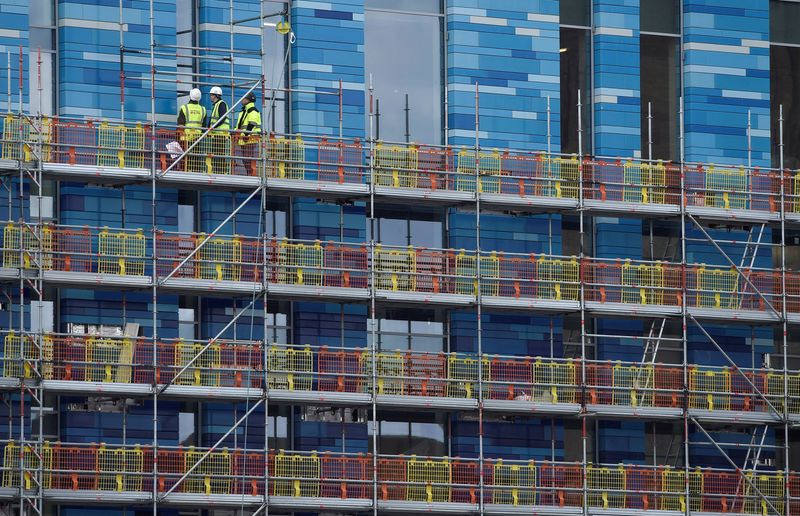Physical Address
304 North Cardinal St.
Dorchester Center, MA 02124
Physical Address
304 North Cardinal St.
Dorchester Center, MA 02124

By Suban Abdulla
WORCESTER, England (Reuters) – An acute shortage of construction workers could undermine the British government’s plans to build 1.5 million homes by 2029 in England to boost economic growth.
Prime Minister Keir Starmer’s Labor Party won the July election on a promise to boost growth and improve infrastructure, as well as fix public services. Construction represents 6% of gross domestic product, but supports growth in other sectors.
While developers have welcomed details of his plans to overhaul Britain’s planning system and free up more land for building, many say the Starmer government’s ambitions are unachievable unless the workforce and skills shortages are tackled.
These shortfalls have raised questions about whether Britain needs to rethink its immigration system after Brexit, along with better training to get more young people into the aging workforce.
“We don’t really have enough workers to build the scale we want to build now, let alone think we’ll get to 1.5 million homes in the next five years,” Lioncourt Homes chief executive Colin Cole said, adding: “So it’s a big problem.”
Kohl said Lioncourt’s 1,000 workers, mostly subcontractors, are working at full capacity to handle existing work.
“We will struggle to get the number of contractors to meet this demand,” said Cole, whose company is due to open its second largest residential site to date in the central English city of Worcester next month.
Lioncourt aims to increase sales to 250 homes in the 12 months from March 2025 to March 2026, up from 165 in the previous 12 months and to 500 over the next five years, a plan that comes ahead of the new government’s reform announcements.
CHALLENGES
The UK has long been short of candidates to fill jobs, a problem exacerbated by the 2016 Brexit vote and COVID-19, with job vacancies higher than their pre-pandemic levels.
Its construction sector, like many other countries, also has to deal with a large number of skilled workers approaching retirement age. The Building Products Association predicts that the sector will lose 500,000 workers to retirement over the next 10 to 15 years, representing around 25% of the total workforce.
Cole said 65% of Lioncourt’s masons are over 45 and about 45% are over 55. Less than 10% are 25 or younger.
Industry and business experts say Britain’s education system is failing to provide the next generation of construction workers with the skills they need.
Only one out of four students who complete regular construction courses is employed after completing further education, according to data from the Association of Builders.
The government has announced 32 skills hubs to provide fast-track training for another 5,000 home-building apprentices a year by 2028 in trades such as bricklaying and scaffolding.
The Construction Industry Training Board – which represents infrastructure as well as home building – said there were around 33,600 apprentices on long-term training programs in 2022-2023, short of the 50,000 needed each year to keep activity going.
One possible answer is that the sector reflects the diversity of the British population. The Chartered Institute of Building said only 6% of workers came from black, Asian or minority ethnic backgrounds, compared to 18% of the general public. Meanwhile, only 15% of the workforce are women.
IMMIGRATION?
Finding construction workers could force Starmer to find a way to reconcile his promises to reduce record levels of migration with the needs of employers.
“You could argue that overseas workers would actually be a pretty useful lever to help them get the labor supply they need,” said Ashley Webb, UK economist at Capital Economics.
Before Brexit, EU citizens had unlimited rights to live and work in Britain. Firms now say that the system of sponsoring European workers makes it extremely difficult to fill the shortfall.
Steve Turner, chief executive of the Construction Workers Union, said the process for employers to sponsor foreign workers was not working, even after the previous Conservative government eased immigration controls for some construction roles, including bricklayers, electricians and carpenters.
“Builders don’t use the system at all because it’s too complex, time-consuming and expensive,” Turner said.
The government says it wants to train people already in Britain to reduce dependence on foreign workers.

“We’re not looking at easing restrictions, but we will be relying partly, partly as a result of changes made by the previous government, on some foreign workers,” Housing Minister Matthew Pennycook said on Thursday.
“We need to do more to train and enable our own people to work in this industry,” he told LBC radio.